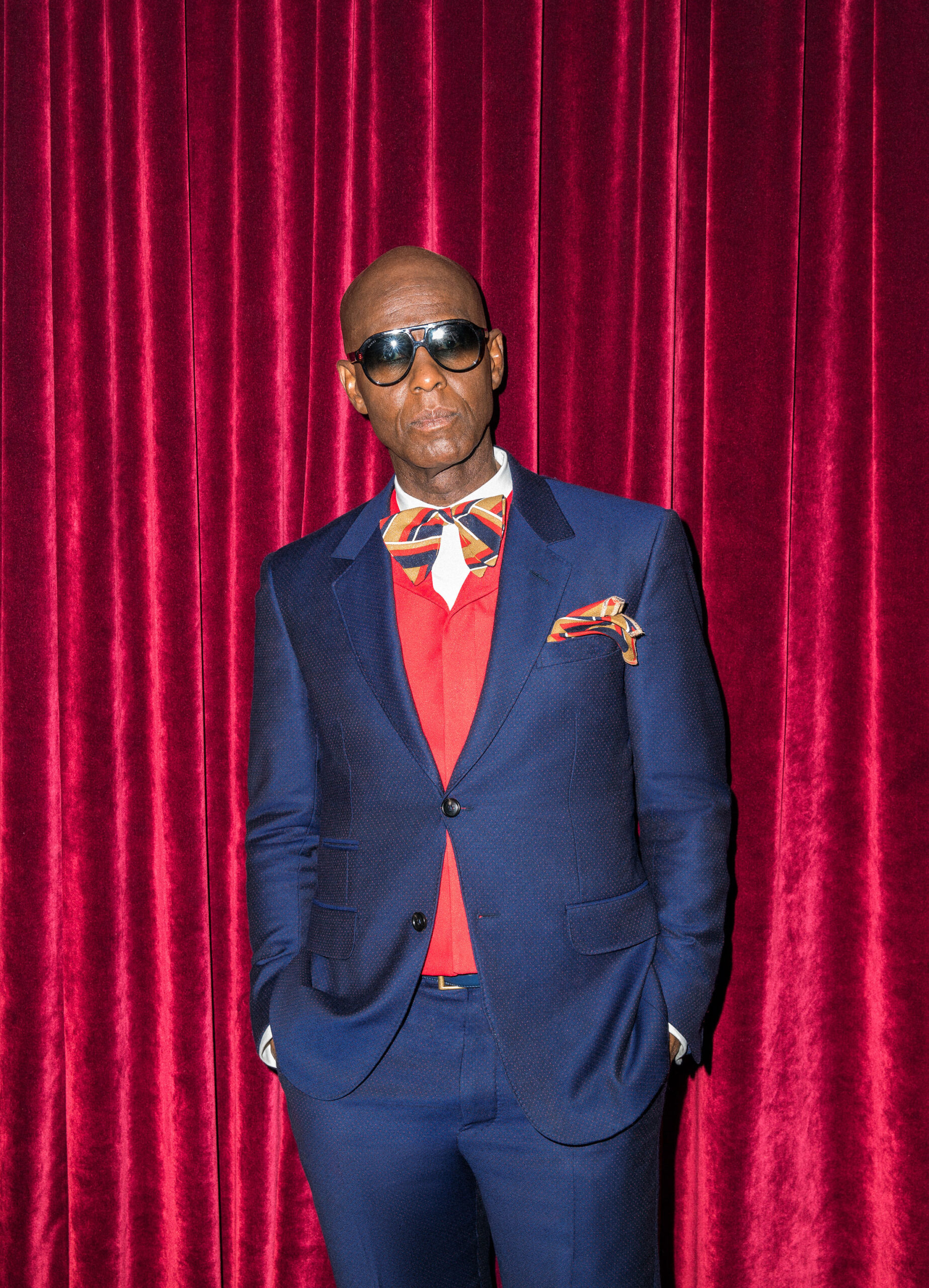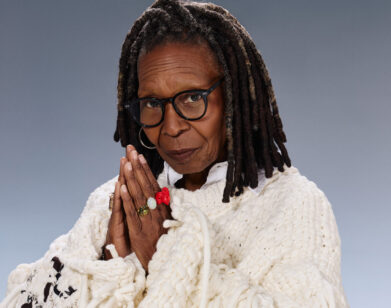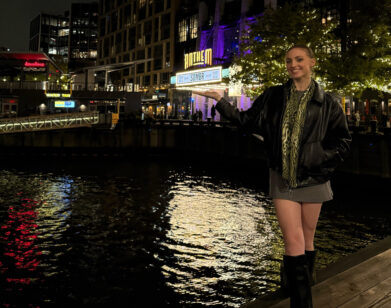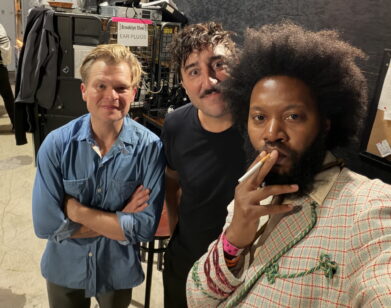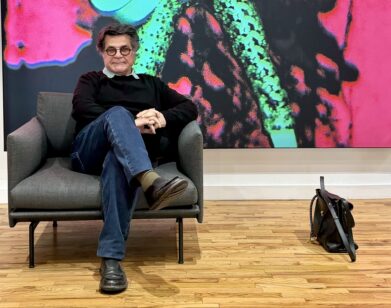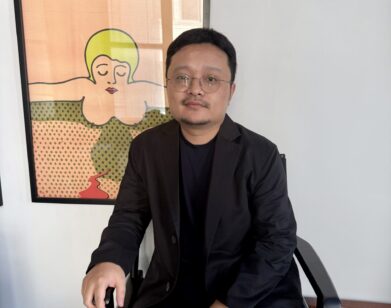ICONS
Dapper Dan Is the “Fairy God Daddy” of Harlem
Dapper Dan is as ubiquitous with New York luxury as Karl Lagerfeld is to Parisian luxury. His innovations know no bounds and often have few manners, so it feels only right that for Brooklyn Public Library’s People’s Ball, the 50th anniversary edition, Dapper Dan was the guest of honor. Days before the ball, Interview‘s consigliere Jeremy O. Harris called the man of the hour to hear his Cinderella story.
———
JEREMY O. HARRIS: Hi Dan!
DAPPER DAN: I’m so excited about this thing. Oh man, this is more than the Met Gala. This is a personal thing for me.
HARRIS: That’s amazing. Are you going to the Met Gala this year?
DAN: No, I’m not going this year.
HARRIS: I believe we might have gone for the first time the same year. Was your first Met Gala in 2019?
DAN: I don’t know. When was it? I didn’t go last year. I went two years prior to last year. So that means I went ’19 and ’20.
HARRIS: Yeah, we’ve been to the same two Met Galas. We were all with Gucci that first year, for the camp Met Gala. And we went with Sinéad Burke. I don’t know if you remember her, but she was the little woman from Ireland.
DAN: Oh, yes. Let me tell you something, I could not believe it. I saw a woman, she had her back to me, same height and everything, at one of the affairs, and it was the most embarrassing thing around. I ran up and gave [her] a hug. I couldn’t believe it was two people in the world, so elegant and so gracious.
HARRIS: Oh my god, this is amazing. It was interesting. She told me that that was the first time that a little person had ever been to the Met Gala. And hearing about the People’s Ball, this space feels like an opportunity for all those people who would maybe be going to The Met Ball as a “first” to not have to carry that burden. They probably aren’t the first here, they’re in a lineage of 50 years of everyone being invited.
DAN: Other than my natural affinity for being around the people that’s going to be attending, it’s also a part of who I am creatively, and the Met Gala is something where it’s more about brands. But the People’s Ball is more about what made me who I am. Expressing that look, and that feel, and that culture that comes straight from the individual and not from the brand. I’m right where I needed to be.
HARRIS: You are such an individual, you made your name by being an individual. But now, that individuality has been subsumed by brands to such a degree that you’re a part of moments like the Met Gala, and a litany of other huge cultural moments. How do you square that for yourself?
DAN: So anybody who has been paying close attention to my career, and where it is now, and where it came from, will recognize that I never went to the brands. The brands came to me, you know? What I mean by that is, I was allowed to continue to be myself. When I first came out to Underground and I got the partnership with Gucci, I told Gucci, you had to come to Harlem, point one. Point two, I told them that I had to be able to continue what I’ve always done, and that’s to be creative. So that I would not lose that which made me who I am, the community and the people who made me who I am. So I’ve always consistently been attached to that, and anybody who I collaborate with would have to have that element. I tell every brand, “I have to be able to dress the people.” So we can have a collection, like the collection I had with Gucci that went around the world. But the primary movement has to come from Harlem, where I’m based at, and it has to be associated with the people around me. Because, I’m constantly inspired by them. There’s no way I could have stayed relevant for 40 years without being able to extract from the community and the common guys, which is where the fashion ideas of today are coming from. So as I always say, I do not dictate fashion, I translate culture. Wherever I am, that has to happen. So you’re right where you need to be, talking to me. I don’t know, y’all can call it the People Ball, but to me it’s the night of the Cinderellas.
HARRIS: It’s the night of the Cinderellas. Does that make you the fairy godmother, or the fairy God Dapper Dan?
DAN: God Daddy.
HARRIS: Fairy God Daddy. I love that.
DAN: So that’s what it’s all about. I want to raise my magical wand over all those people and tell them you are what it’s all about. The Met Gala is just something that’s been extracted from you guys. Because you are responsible for the Met Gala. Without you guys, without that creativity coming from the grassroots, there would be no Met Gala.
HARRIS: That brings up another great thing I wanted to ask you about, which is, when you think about your lineage, what you’re giving to the next generation, do you worry, or wonder, about how the next generation of people are going to keep making the type of culture that inspires things like the Met Gala? In a moment when we are all online, everyone’s eyes are looking at similar things and consuming at this huge rate. Hyper-capitalism. And you’re seeing younger and younger people actually finding ways to afford all of these really expensive brands. Do you worry that that access is sort of going to stifle creativity in any way?
DAN: That’s an excellent question, and that’s what I love to address at all times. Let me put it the way I usually put it. The brands turn things over to suit themselves and to suit the market. In order for the chemistry to work between where ideas come from, and how ideas are marketed, you have to constantly be generating new ideas. So a person like myself in fashion, or a person like Jay-Z in music, we have to keep opening up pathways for us to develop the next Jay-Z and the Dapper Dan. In order to do that, we have to be conscious of making sure those pathways are open. The answer to your question is, that’s what I fight for. That’s what I fight hard for. When you look at the diversity and inclusion, my main concern and fear, with diversity and inclusion, is that it sets up a system of meritocracy. When these big brands recruit, they recruit talented people who are already well-developed. As opposed to guys like Jay-Z and Dapper Dan, who are developing from the raw. So when I say meritocracy, a lot of these people that are coming into the fold of these brands, will probably make it in life in other areas anyway. But the Jay-Z’s and the Dapper Dan’s, this is a battle for our life and for our creativity. This is the blood that runs through our veins, and I have to nurture that idea. So that’s why I stay in Harlem. I walk around in Harlem, take the train and all that, so that the corner people like myself and Jay-Z can be inspired. Do you follow what I’m saying?
HARRIS: I understand exactly what you’re saying. Opening doors is the most important thing, and I think that’s why it’s so exciting that, as there’s such a threat that the libraries of America will be shuttered, that you’re doing this at the Brooklyn Public Library. Eric Adams was cutting funding to all of the libraries, and he just went back on that. For me, I do think that this is a moment we need to increase that funding. Republicans don’t want people reading books anymore. What does it mean to you to be doing this in a place where the people’s imagination can be opened up so much?
DAN: Let me tell you why, to me, the library is so fascinating. I grew up in the poorest neighborhood in Harlem, and what I learned from my father, who only went to the third grade, is how essential it was to read. The beauty of a library is it’s a place where you can go and sit down with people who you could never talk to, people who you could never come into contact with, and hold court with them through the words that they left behind. So that’s what changed my entire life. That’s why I go up on 135th Street. I was born in the house, but that’s where they took us as soon as we were born, to Harlem Hospital. Most people born and raised in Harlem are basically from the Harlem Hospital, come through the Harlem Hospital. So one side of the street is the Harlem Hospital and on the other side of the street is the Schomburg Library. It’s the most important repository for African-American and Latino history in the United States and probably the world. So it’s just like, one stop is how you are born into the world, and the next stop across the street enables you to create the world that you want to have. It’s where the Harlem Renaissance was formulated, with Langston Hughes and Arna Bontemps and Lorraine Hansberry. So a library, to me, is a lifeline for rebirth.
HARRIS: That’s amazing. I absolutely love everything you’ve just said, and it strikes a chord with me, especially, landing there with Lorraine Hansberry. I really want to invite you to Broadway right now. I’m doing a revival of Lorraine Hansberry’s, The Sign in Sidney Brustein’s Window, which is the last play she wrote. She wrote it when she was 35, and she was passing when she was writing it. It’s such a beacon of hope, I think, for young writers and young audiences to see this history. So it was very cool and serendipitous to hear you say that. I want to know one fun thing before we go. What are you wearing?
DAN: Oh, I’m wearing a Dapper Dan special. What is the color of royalty? What is the color of passion?
HARRIS: Well, I would say passion is sort of red, and I’d say royalty is purple.
DAN: Okay, say no more.
HARRIS: Okay.
DAN: Now, I want to close because you touched my spine when you mentioned Lorraine Hansberry. So the elementary school that I went to in Harlem is where Langston Hughes lived right across the street from. When he wrote the poem, Harlem, a Dream Deferred?
HARRIS: Absolutely.
DAN: There’s a line in there. “What happens to a raisin in the sun?” And Lorraine Hansberry heard that poem by Langton Hughes and wrote the play A Raisin in the Sun. So, me and you are on the same page with that, man.
HARRIS: Absolutely.
DAN: Yes.
HARRIS: Well, Dapper Dan, it has been such a gift and an honor to be with you again, and I can’t wait until the next Gucci hangout, or dinner party, or Harlem Night, wherever we run into each other.
DAN: Yeah, you got to come to Harlem, man.
HARRIS: I will. I used to stay in Harlem but then someone broke my heart in Harlem. So I had to run downtown.
DAN: You better check your birth certificate because you are a Harlem knight.
HARRIS: Unfortunately I was born very much in Virginia, but a lot of Virginians ended up in Harlem.
DAN: All right, see you Sunday.

